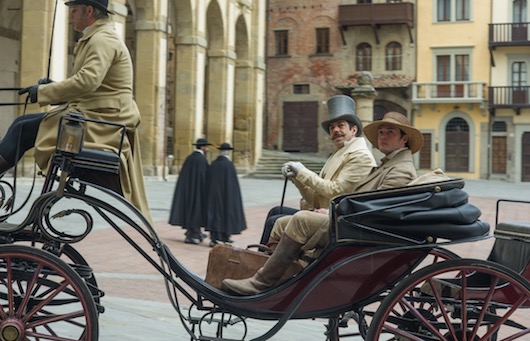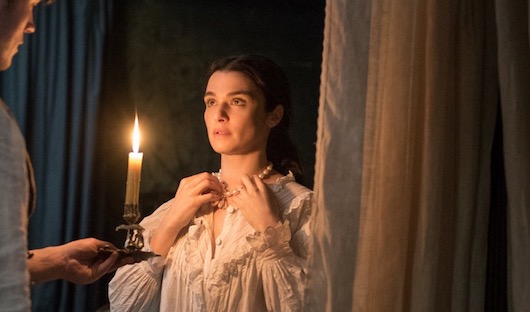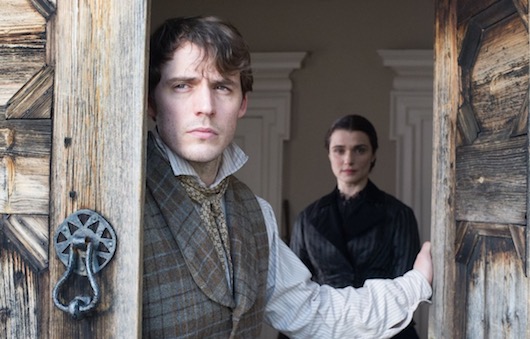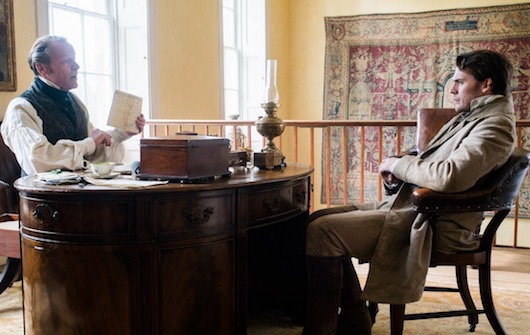 FILM
FILM « In Which Rachel Reminds Us Of Ourselves »
 Monday, June 19, 2017 at 10:24AM
Monday, June 19, 2017 at 10:24AM 
Where to Begin
by ELEANOR MORROW
My Cousin Rachel
dir. Roger Michell
103 minutes
 As the only woman to successfully consummate a relationship with both Daniel Craig and Darren Aronofsky, Rachel Weisz has so much to teach us. So as not to be overwhelmed with her outstanding Rachelness, we never linger on her trademarked self-possession too long in My Cousin Rachel, Roger Michell's adaptation of a dull Daphne du Maurier novel. Her scenes are all flitting, finding her dashing in or out of a room. She is continuously interrupted by the son (Phillip) of her now deceased husband Ambrose.
As the only woman to successfully consummate a relationship with both Daniel Craig and Darren Aronofsky, Rachel Weisz has so much to teach us. So as not to be overwhelmed with her outstanding Rachelness, we never linger on her trademarked self-possession too long in My Cousin Rachel, Roger Michell's adaptation of a dull Daphne du Maurier novel. Her scenes are all flitting, finding her dashing in or out of a room. She is continuously interrupted by the son (Phillip) of her now deceased husband Ambrose.
Sam Claiflin (Me Before You) portrays Philip as an immature, coddled orphan who idolized the father who adopted him after his mother perished. When Ambrose develops a serious brain tumor, he packs off to Italy where he meets his wife. Since Ambrose lives in the most glorious part of England one can ever imagine, this choice seems a bit bizarre; then again, no one can ever properly account for the tastes of the English.

As a local woman obsessed with Philip, Holliday Grainger steals the show in My Cousin Rachel. She disapproves of Philip's stepmother, and after Rachel arrives in England, she and her father/Philip's godfather Nick (Iain Glen) do everything they can to persuade Philip that his stepmother is a freespending, manipulative malingerer who only wishes to deprive him of his considerable fortune. "You are very lucky," Nick tells Philip, since he has so much money he can give it to Rachel freely and without any caution.

Philip's father abandoned the entire concept of women to care for his son, and Philip took up his father's example. It is not so terribly difficult for Sam Claiflin to act like a eunuch and virgin – he always look vaguely pent-up and constipated in himself. Whenever he plays concern or caution, he tenses up his cheekbones, giving his countenance the look of a castrated horse. Out of kindness, Rachel throws him a fuck one night since he reminds her of Ambrose.

This turns out to be a very serious mistake, since afterwards Philip expects more sex. This results in a very uncomfortable scene where Rachel lies motionless in a garden of bluebells while her stepson penetrates her missionary-style. It is the only really good look we get at Rachel in My Cousin Rachel, and what a harrowing moment it is.
The idea that the blind assumptions of men about women are more likely to bring about feminine doom rather than patriarchal instability is a funny one. Roger Michell, who wrote the adaptation of the novel as well as directed My Cousin Rachel, expands on this idea and tries to make it work onscreen in a new way. He succeeds completely, and the film becomes a dreary, upsetting portrait of unhappiness.
Eleanor Morrow is the senior contributor to This Recording.

 eleanor morrow,
eleanor morrow,  rachel weisz
rachel weisz 





























Reader Comments